7A Unit4语言点归纳
七年级上册英语unit4知识点

七年级上册英语unit4知识点七年级上册英语Unit4 知识点Unit4主要涉及描述人物外貌、性格和兴趣爱好等常用英语表达。
本文将介绍Unit4的知识点,以帮助读者巩固英语语法和词汇。
一、基本句型1.主语+be动词+形容词例如:Tom is tall and thin.Lily is beautiful and kind.2.主语+be动词+不定式例如:My dream is to be a doctor.His goal is to travel around the world.3.主语+be动词+名词例如:She is a teacher.He is a musician.4.主语+动词+副词例如:The dog runs quickly.She speaks English fluently.5.主语+动词+宾语例如:He likes playing basketball. They enjoy watching movies.6.主语+动词+间接宾语+直接宾语例如:She gave him a book.They showed us how to cook.7.主语+情态动词+动词原形例如:I can swim.He should study harder.二、形容词形容词用于描述人的外貌和性格,下面列出一些常用的形容词:外貌高:tall矮:short胖:fat瘦:thin漂亮:beautiful帅气:handsome性格友好:friendly腼腆:shy聪明:smart勇敢:brave慷慨:generous害羞:timid三、不定式不定式用于表示目的或意图,下面列举一些常用的不定式:to be:成为to do:做to have:拥有to go:去to learn:学习to play:玩to read:读to see:看to sing:唱歌四、人物的兴趣爱好人物的兴趣爱好也是本单元的重点,下面是一些有用但简单的短语:play sports:运动listen to music:听音乐play musical instruments:演奏乐器read books:阅读watch TV:看电视draw pictures:画画write stories:写作五、总结总之,Unit4主要强调描述人物的外貌、性格和兴趣爱好等方面。
人教选修七 Unit4 Sharing词汇语言点
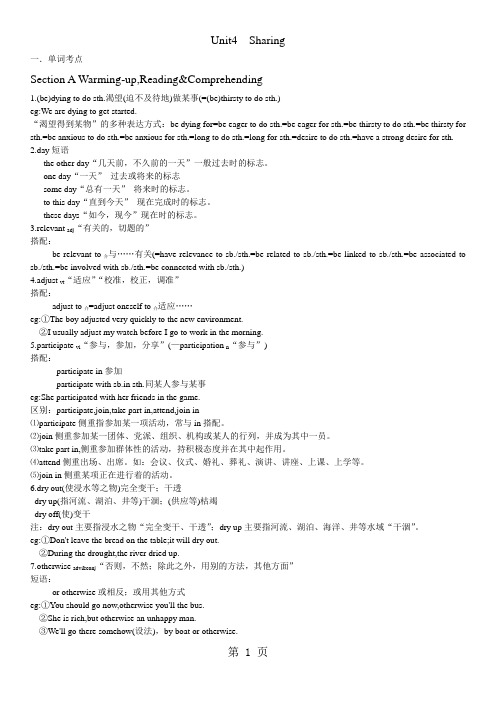
Unit4 Sharing一.单词考点Section A Warming-up,Reading&Comprehending1.(be)dying to do sth.渴望(迫不及待地)做某事(=(be)thirsty to do sth.)eg:We are dying to get started.“渴望得到某物”的多种表达方式:be dying for=be eager to do sth.=be eager for sth.=be thirsty to do sth.=be thirsty for sth.=be anxious to do sth.=be anxious for sth.=long to do sth.=long for sth.=desire to do sth.=have a strong desire for sth. 2.day短语the other day“几天前,不久前的一天”一般过去时的标志。
one day“一天”过去或将来的标志some day“总有一天”将来时的标志。
to this day“直到今天”现在完成时的标志。
these days“如今,现今”现在时的标志。
3.relevant adj“有关的,切题的”搭配:be relevant to介与……有关(=have relevance to sb./sth.=be related to sb./sth.=be linked to sb./sth.=be associated to sb./sth.=be involved with sb./sth.=be connected with sb./sth.)4.adjust vt“适应”“校准,校正,调准”搭配:adjust to介=adjust oneself to介适应……eg:①The boy adjusted very quickly to the new environment.②I usually adjust my watch before I go to work in the morning.5.participate vi“参与,参加,分享”(—participation n“参与”)搭配:participate in参加participate with sb.in sth.同某人参与某事eg:She participated with her friends in the game.区别:participate,join,take part in,attend,join in⑴participate侧重指参加某一项活动,常与in搭配。
牛津译林版七年级英语上册7A Unit4单元知识点总结
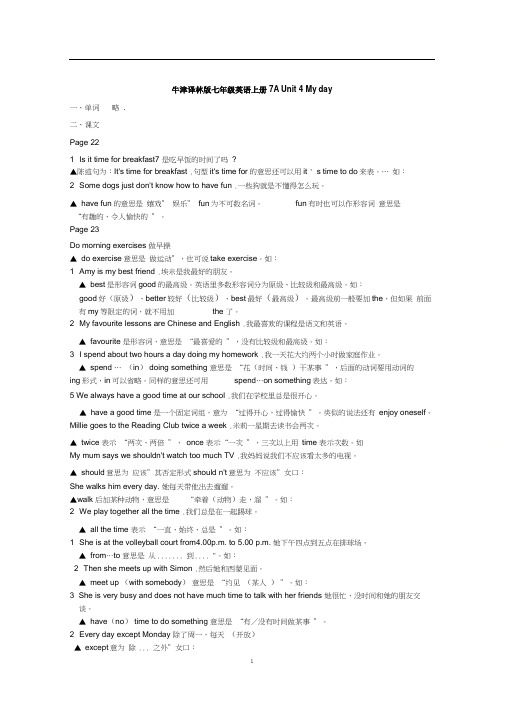
牛津译林版七年级英语上册7A Unit 4 My day一、单词略.二、课文Page 221 Is it time for breakfast7 是吃早饭的时间了吗?▲陈述句为:It's time for breakfast .句型it's time for的意思还可以用it ' s time to do来表。
… 如:2 Some dogs just don't know how to have fun .一些狗就是不懂得怎么玩。
▲have fun的意思是嬉戏” 娱乐” fun为不可数名词。
fun有时也可以作形容词意思是“有趣的,令人愉快的”。
Page 23Do morning exercises 做早操▲do exercise意思是做运动”,也可说take exercise。
如:1 Amy is my best friend .埃米是我最好的朋友。
▲best是形容词good的最高级。
英语里多数形容词分为原级、比较级和最高级。
如:good好(原级)、better较好(比较级)、best最好(最高级)。
最高级前一般要加the,但如果前面有my等限定的词,就不用加the 了。
2 My favourite lessons are Chinese and English .我最喜欢的课程是语文和英语。
▲favourite 是形容词,意思是“最喜爱的”,没有比较级和最高级。
如:3 I spend about two hours a day doing my homework .我一天花大约两个小时做家庭作业。
▲spend … (in) doing something 意思是“花(时间、钱)干某事”,后面的动词要用动词的ing形式,in可以省略。
同样的意思还可用spend…on something表达。
如:5 We always have a good time at our school .我们在学校里总是很开心。
人教版七年级英语上册unit 4 句子讲解及知识点梳理
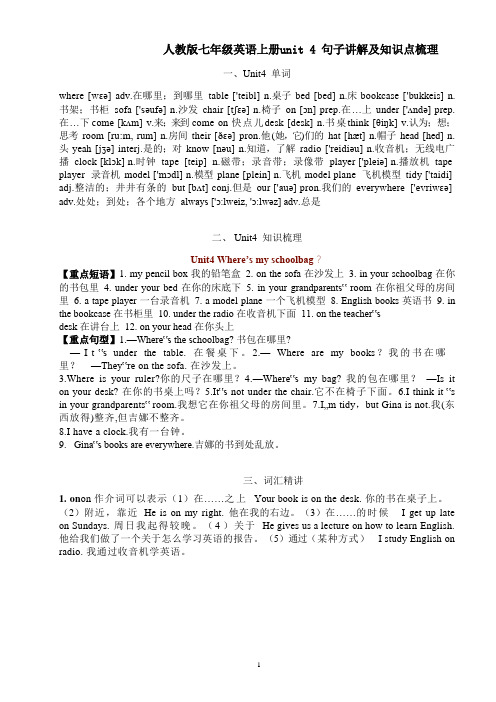
人教版七年级英语上册unit 4 句子讲解及知识点梳理一、Unit4 单词where [wɛə] adv.在哪里;到哪里table ['teibl] n.桌子bed [bed] n.床bookcase ['bukkeis] n. 书架;书柜sofa ['səufə] n.沙发chair [tʃɛə] n.椅子on [ɔn] prep.在…上under ['ʌndə] prep. 在…下come [kʌm] v.来;来到come on 快点儿desk [desk] n.书桌think [θiŋk] v.认为;想;思考room [ru:m, rum] n.房间their [ðɛə] pron.他(她,它)们的hat [hæt] n.帽子head [hed] n. 头yeah [jʒə] interj.是的;对know [nəu] n.知道,了解radio ['reidiəu] n.收音机;无线电广播clock [klɔk] n.时钟tape [teip] n.磁带;录音带;录像带player ['pleiə] n.播放机tape player 录音机model ['mɔdl] n.模型plane [plein] n.飞机model plane 飞机模型tidy ['taidi] adj.整洁的;井井有条的but [bʌt] conj.但是our ['auə] pron.我们的everywhere ['evriwɛə] adv.处处;到处;各个地方always ['ɔ:lweiz, 'ɔ:lwəz] adv.总是二、 Unit4 知识梳理Unit4 Where’s my schoolbag?【重点短语】1. my pencil box 我的铅笔盒 2. on the sofa 在沙发上 3. in your schoolbag 在你的书包里4. under your bed 在你的床底下 5. in your grandparents‟ room 在你祖父母的房间里 6. a tape player 一台录音机7. a model plane 一个飞机模型8. English books 英语书9. in the bookcase 在书柜里10. under the radio 在收音机下面11. on the teacher‟sdesk 在讲台上12. on your head 在你头上【重点句型】1.—Where‟s the schoolbag? 书包在哪里?—I t ‟s under the table. 在餐桌下。
仁爱版英语七年级上册7A_unit4_topic2_课文重难点讲解(含答案)
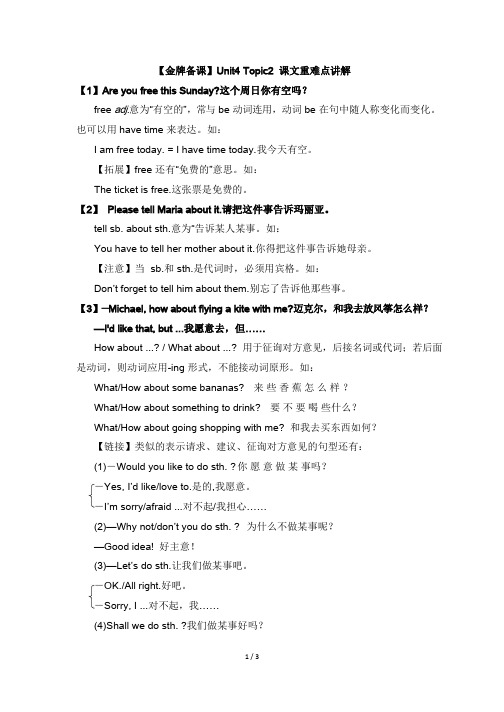
【金牌备课】Unit4 Topic2 课文重难点讲解【1】Are you free this Sunday?这个周日你有空吗?free adj.意为“有空的”,常与be 动词连用,动词be 在句中随人称变化而变化。
也可以用have time 来表达。
如:I am free today. = I have time today.我今天有空。
【拓展】free 还有“免费的”意思。
如:The ticket is free.这张票是免费的。
【2】Please tell Maria about it.请把这件事告诉玛丽亚。
tell sb. about sth.意为“告诉某人某事。
如:You have to tell her mother about it.你得把这件事告诉她母亲。
【注意】当sb.和sth.是代词时,必须用宾格。
如:Don’t forget to tell him about them.别忘了告诉他那些事。
【3】-Michael, how about flying a kite with me?迈克尔,和我去放风筝怎么样?—I'd like that, but ...我愿意去,但……How about ...? / What about ...? 用于征询对方意见,后接名词或代词;若后面是动词,则动词应用-ing 形式,不能接动词原形。
如:What/How about some bananas? 来些香蕉怎么样?What/How about something to drink? 要不要喝些什么?What/How about going shopping with me? 和我去买东西如何?【链接】类似的表示请求、建议、征询对方意见的句型还有:(1)-Would you like to do sth. ?你愿意做某事吗?-Yes, I’d like/love to.是的,我愿意。
-I’m sorry/afraid ...对不起/我担心……(2)—Why not/don’t you do sth. ? 为什么不做某事呢?—Good idea! 好主意!(3)—Let’s do sth.让我们做某事吧。
7A Unit4 知识点
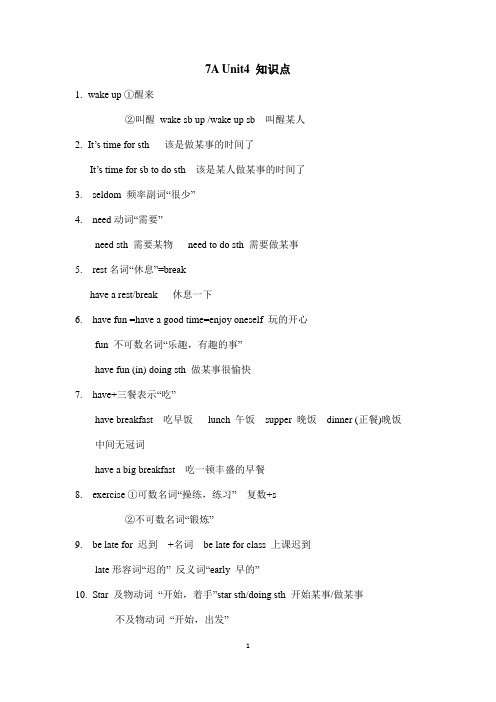
7A Unit4 知识点1.wake up ①醒来②叫醒wake sb up /wake up sb 叫醒某人2.It’s time for sth 该是做某事的时间了It’s time for sb to do sth 该是某人做某事的时间了3.seldom 频率副词“很少”4.need动词“需要”need sth 需要某物need to do sth 需要做某事5.rest名词“休息”=breakhave a rest/break 休息一下6.have fun =have a good time=enjoy oneself 玩的开心fun 不可数名词“乐趣,有趣的事”have fun (in) doing sth 做某事很愉快7.have+三餐表示“吃”have breakfast 吃早饭lunch 午饭supper 晚饭dinner (正餐)晚饭中间无冠词have a big breakfast 吃一顿丰盛的早餐8.exercise ①可数名词“操练,练习” 复数+s②不可数名词“锻炼”9.be late for 迟到+名词be late for class 上课迟到late形容词“迟的” 反义词“early 早的”10.Star 及物动词“开始,着手”star sth/doing sth 开始某事/做某事不及物动词“开始,出发”The party starts with an English song.晚会以一首英文歌开始。
11.quarter 一刻钟;四分之一12.past 介词“晚于;经过go past”past 名词“往时,昔日,过去”13.first 副词“首先” at first 首先,起初After school,I always finish my homework.放学后,我总是先完成我的家庭作业。
序数词“第一”Sunday is the first day of a week. 星期天是一周的第一天。
七年级英语7aunit4知识点牛津译林版
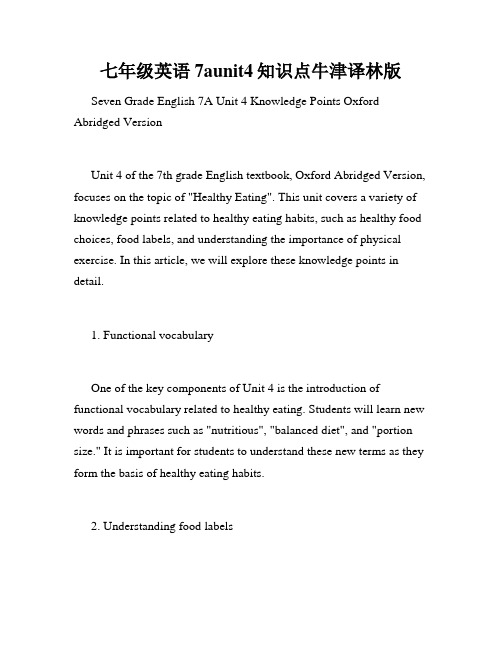
七年级英语7aunit4知识点牛津译林版Seven Grade English 7A Unit 4 Knowledge Points Oxford Abridged VersionUnit 4 of the 7th grade English textbook, Oxford Abridged Version, focuses on the topic of "Healthy Eating". This unit covers a variety of knowledge points related to healthy eating habits, such as healthy food choices, food labels, and understanding the importance of physical exercise. In this article, we will explore these knowledge points in detail.1. Functional vocabularyOne of the key components of Unit 4 is the introduction of functional vocabulary related to healthy eating. Students will learn new words and phrases such as "nutritious", "balanced diet", and "portion size." It is important for students to understand these new terms as they form the basis of healthy eating habits.2. Understanding food labelsAnother important knowledge point covered in this unit is how to read food labels. Students will learn how to identify the different types of nutrients, such as fat, salt, and sugar, and how to understand their measurements. By being able to read food labels, students can make informed decisions about their food choices.3. Healthy food choicesUnit 4 also covers the importance of making healthy food choices. Students will learn about the food groups, such as fruits and vegetables, carbohydrates, proteins, and fats, and the essential nutrients found in each group. By understanding the importance of a balanced diet and the nutrients required for healthy living, students can make better food choices.4. Exercise for a healthy lifestyleFinally, Unit 4 emphasizes the importance of physical exercise for a healthy lifestyle. Students will learn about the different types of exercise and their benefits, such as cardio, strength training, and flexibility exercises. By understanding the different types of exercise and their benefits, students can make informed decisions about their physical activity.ConclusionUnit 4 of the 7th-grade English textbook, Oxford Abridged Version, covers a variety of knowledge points related to healthy eating habits and physical exercise. By understanding functional vocabulary, reading food labels, making healthy food choices, and incorporating physical activity into their daily routine, students can develop a healthy lifestyle. By following these knowledge points, students can maintain their physical and mental health and achieve greater success in their academic and personal lives.。
人教版七年级英语上册Unit4短语句型知识点总结
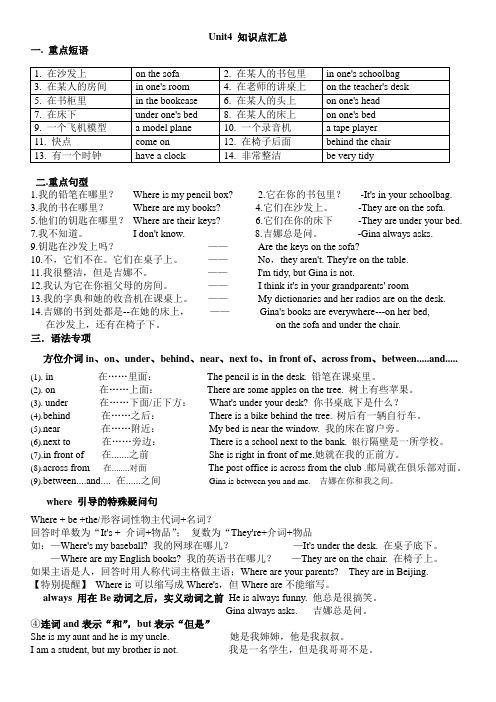
Unit4 知识点汇总一.重点短语1. 在沙发上on the sofa2. 在某人的书包里in one's schoolbag3. 在某人的房间in one's room4. 在老师的讲桌上on the teacher's desk5. 在书柜里in the bookcase6. 在某人的头上on one's head7. 在床下under one's bed 8. 在某人的床上on one's bed9. 一个飞机模型 a model plane 10. 一个录音机 a tape player11. 快点come on 12. 在椅子后面behind the chair13. 有一个时钟have a clock 14. 非常整洁be very tidy二.重点句型1.我的铅笔在哪里?Where is my pencil box?2.它在你的书包里?-It's in your schoolbag.3.我的书在哪里?Where are my books?4.它们在沙发上。
-They are on the sofa.5.他们的钥匙在哪里?Where are their keys?6.它们在你的床下-They are under your bed.7.我不知道。
I don't know.8.吉娜总是问。
-Gina always asks.9.钥匙在沙发上吗?——Are the keys on the sofa?10.不,它们不在。
它们在桌子上。
——No,they aren't. They're on the table.11.我很整洁,但是吉娜不。
——I'm tidy, but Gina is not.12.我认为它在你祖父母的房间。
——I think it's in your grandparents' room13.我的字典和她的收音机在课桌上。
- 1、下载文档前请自行甄别文档内容的完整性,平台不提供额外的编辑、内容补充、找答案等附加服务。
- 2、"仅部分预览"的文档,不可在线预览部分如存在完整性等问题,可反馈申请退款(可完整预览的文档不适用该条件!)。
- 3、如文档侵犯您的权益,请联系客服反馈,我们会尽快为您处理(人工客服工作时间:9:00-18:30)。
7A Unit4 重点词组、难点解析、语法复习
【词组总汇】
Comic strip &Welcome to the unit
1.wake up 醒醒P.42
2.go walking in the hills 在山间散步P.42
3.after breakfast/lunch 早餐/午饭过后P.42
4.have breakfast/lunch 吃早饭/午饭P.42
5.need a good rest 需要好好休息P.42
6.how to have fun 如何享乐P.42
7.a day at school 在校的一天P.43
8.get up 起床P.43
9.do morning exercises 做早操P.43
10.have lessons 上课P.43
11.do after-school activities 进行课外活动P.43
12.watch TV 看电视P.43
13.do homework 做家庭作业P.43
14.be late for school 上学迟到P.43
15.at a quarter past eight 在八点一刻P.43
Reading
1.school life 学校生活P.44
2.write to her online friend 写信给她的网友P.44
3.a student at Sunshine Middle School 阳光中学的一名学生P.44
4.from Monday to Friday 从星期一到星期五P.44
5.my favourite subject 我最喜欢的学科P.44
6.a lot of friends 许多朋友P.44
7.chat with each other 互相聊天P.44
8.play in the playground 在操场上玩P.44
9.go to the library 去图书馆P.44
10.read books there on Tuesday and Thursday 周二和周四在那儿读书P.44
11.in the school volleyball team 在校排球队P.44
12.on Wednesday afternoon 在星期三下午P.44
13.have a good time 玩得愉快P.44
14.Best wishes 最美好的祝愿P.44
Grammar
1.plant trees 植树P.47
2.in March 在三月份P.47
3.in winter 在冬天P.47
4.in 2022 在2022年P.47
5.our summer holiday 我们的暑假P.47
6.have lots of fun 玩得开心P.47
7.on Children’s Day 在儿童节P.47
8.at six years old 在六岁时P.47
9.Thanks for your email. 谢谢你的邮件。
P.47
10.would like to tell you about my life here 想要告诉你我在这儿的生活P.47
11.this year 今年P.47
12.have much time to play tennis 有许多时间打网球P. 48
13.dancing lessons 舞蹈课P. 48
14.a member of the swimming team 游泳队的一名成员P. 48
15.dance for half an hour 跳舞半小时P. 48
16.go roller skating 溜旱冰P. 48
Integrated skills
1.between… and…在…和…之间P.50
2.this Saturday evening 这个周六晚上P.50
3.good luck 好运P.50
4.visit the museums 参观博物馆P.50
5.twice a month 一月两次P.50
6.go on picnics with my family 和我的家人一起去野炊P.50
7.once a week 一周一次P.50
Study skills
1.a car in the park 公园里的汽车P.51
2.a girl in a skirt 穿短裙的女孩P.51
Task
1.be good for 对…有好处P.52
2.get ready for 为…做准备P.52
3.learn a lot about the world 学习许多有关世界的知识P.52
4.too much homework 太多的家庭作业P.52
5.all the lessons at school 学校所有的课程P.52
【难点解析】
1.wake up 醒醒P.42
a.不及物动词短语,adj.+adv. 表示“醒来”
b.及物动词短语,表示“叫醒…”如果所接宾语时人称代词,只能放在up之前,若
所接宾语时名词,放在up前后均可。
例如:
wake me up 把我叫醒
wake up Millie / wake Millie up 把米莉叫醒
e.g.: 1. 我不想早醒,但是我妈妈总是早早地把我叫醒。
I don’t want to wake up early, but my mother always wakes me up early.
2. 请明天早上六点叫醒John。
Please wake John up / wake up John at 6:00 tomorrow morning.
2. Is it time for breakfast?到时间吃早饭了吗?P.42
= Is it time to have breakfast?
句子结构:It's time for sth. 到…的时间了。
= It's time to do sth.。
